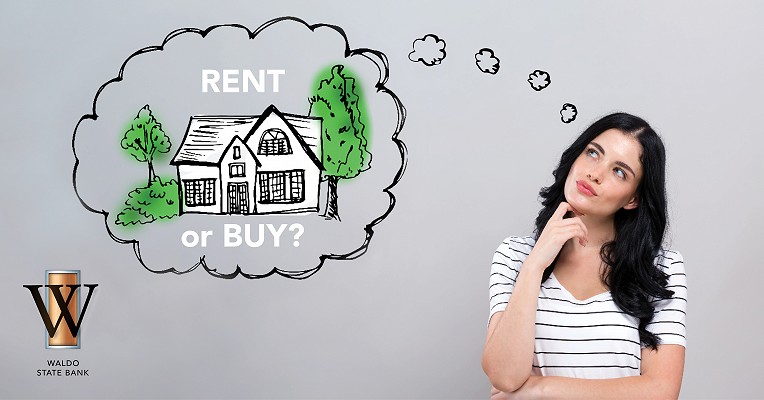Rent or Buy: What Fits Your Lifestyle?

An estimated 811,000 homes were sold in 2020, making an 18.8% increase in the number of homes sold in 2019.1
2020 was a record year in real estate with low rates and high cost of homes, both of which have future homeowners thinking. Is it truly better to rent? Or is it better to buy? Our financial experts at Waldo State Bank lay out some pros and cons to help you make the most informed decision to rent or buy for you and your lifestyle.
The Price Tag
The number one aspect to consider when looking to rent or buy a home is the cost. Are you looking for a short-term stint or a long-term haul when it comes to a place to live? When renting, the cost of rent tends to rise steadily. This means you may end up paying more for rent than you would a mortgage payment.
However, with renting, there is a predictable amount you need to spend every month. It's also typically a cheaper option than buying a home in the short-term. In Sheboygan, the average rent ranges from $1,050 (studio) to $2,050 per month (2-bedroom). In Wisconsin, the average rent ranges from $569 (studio) to $1,198 (4-bedroom).
When buying a home, you're essentially paying down a loan for a fixed term. Our financial experts have several resources to help prepare you for the homebuying process. This includes determining if pre-qualification for a home loan is the right option for you. You can refinance to obtain a better interest rate during the loan's life, but some flux comes with a mortgage. Mortgage payments may still increase if taxes increase or homeowner's insurance rises.
Some added costs to consider when renting versus buying are maintenance and repair costs. There are no maintenance costs or repair bills when renting as the rental company or landlord cover issues. However, if you own a home, you absorb all of those costs. Another added cost that applies to both would be renter's insurance and homeowner's insurance.
The Equity
Despite rent being typically cheaper than owning a home in the short-term, owning a home provides an investment in the long run. As homes typically appreciate over time and improvements are made to the home, the property value also increases, and in return, your equity also grows.
For example, the home you buy is worth $150,000, and as you make your mortgage payments and improvements to your home, the property value becomes greater than what your home was originally worth. The amount you make after selling the home is yours!
Whereas the monthly investment through renting doesn't provide equity, buying a home makes your investment work for you.
Owning a home also provides tax benefits on top of equity, while renting doesn't provide any additional cost savings.
The Freedom
Renting does provide the flexibility of living anywhere you can afford the monthly payment. You usually give a 30-day notice, and you can leave, no strings attached. With homeownership, you have to take into consideration additional fees, time, and added effort with selling your old home, moving, and then buying a new home.
The flexibility that renting brings also comes at a cost. You may have the freedom to move from one spot to another more easily than buying a home. Still, you endure neighbors more closely associated with space, building requirements and restrictions, and a landlord who has keys to your personal space. You run the risk of your rental being sold as well as management and the rules changing without warning. With owning a home, you dictate any decisions being made to your property and obtain real privacy.
Whether you rent or buy, the decision is dependent on where you choose to live, the local housing market, and the kind of lifestyle you choose to live. Don't decide to rent or buy alone! Our financial experts are here to help you make the best financial decision on renting or buying. Contact us today!